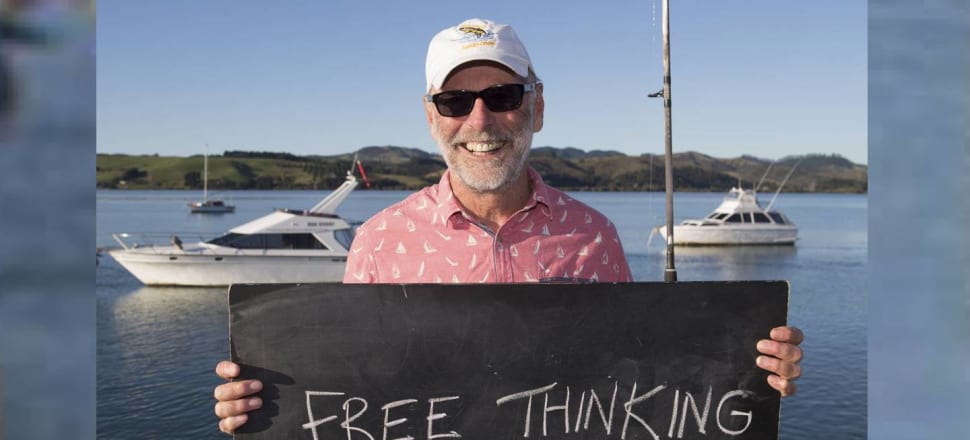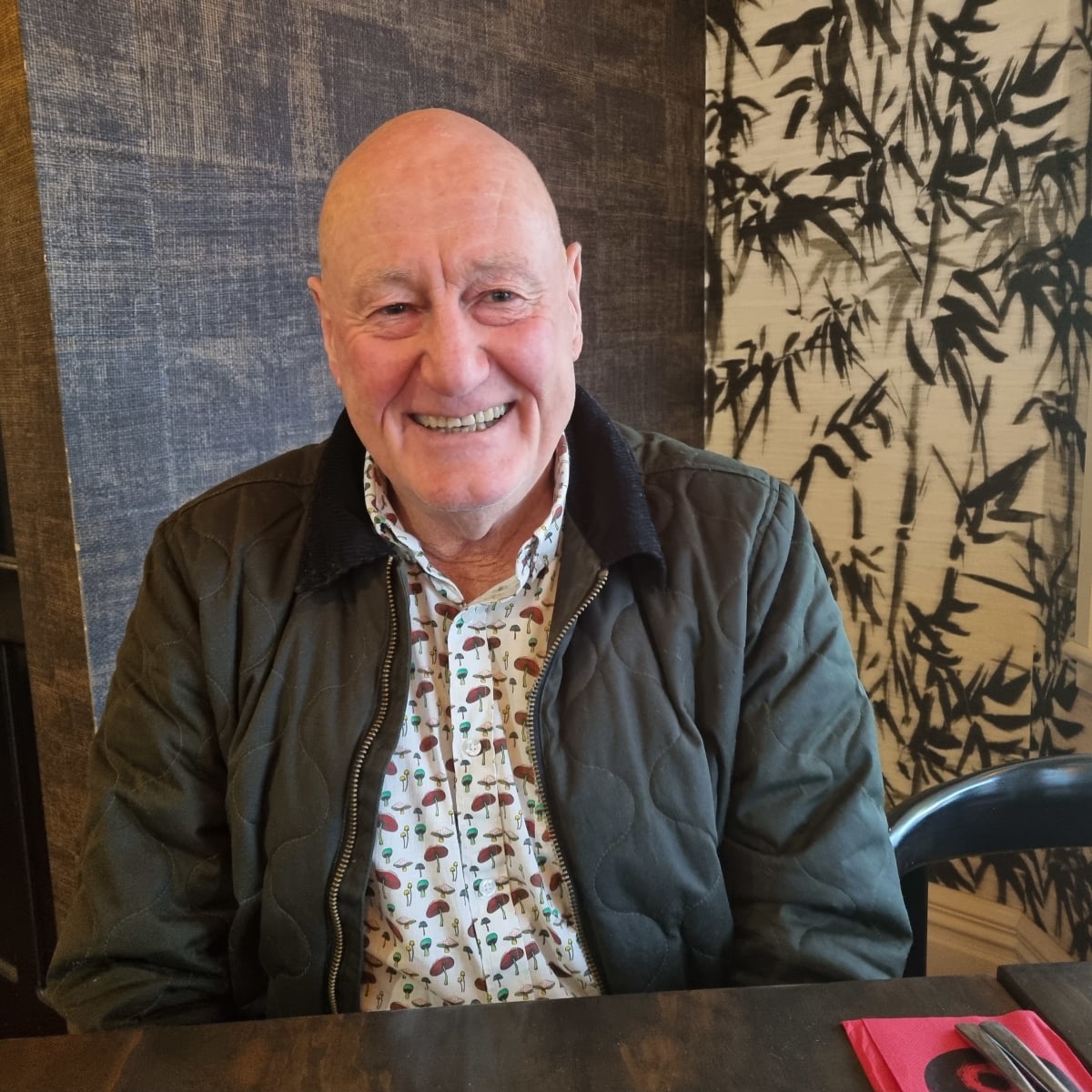
The man who would be Mayor of Auckland has already had a stint as a mayor in the Far North - voted out comprehensively after rocking the council, and after an Auditor-General's report into his handling of personal interests
With the abrupt exit of colourful restaurateur Leo Molloy from the Auckland mayoral race, centre-right support looks to be building for the candidate who denounced his opponent's free-wheeling profanity.
Wayne Brown - engineer, surfer, developer, self-made multi-millionaire and mender of giant broken things is now running second in the latest polls to Labour’s choice, Efeso Collins.
The self-described Mr Fixit – who’s known for the odd expletive himself, though usually in private - has been called on over the years by governments of both stripes to rescue corporates in trouble – from Transpower to DHBs.
But his lengthy resume also includes a stint as Far North mayor.
Lois Williams who covered Northland for many years for RNZ has been having a think about what sort of mayor Mr Brown might make for Auckland.
And what Aucklanders might make of the bloke known to many as ‘Brownie’.
****
If anyone can ‘fix’ Auckland, it’s got to be Wayne Brown – just don’t expect him to be patient or polite about it.
That’s the message that comes though repeatedly from sources who know Brown and worked with him in the north.
There are those who are still licking their wounds from bruising verbal encounters with the former Far North mayor – some of them ex-council staff.
They see him as arrogant and rude. And will not speak on the record.
Free event: Join Newsroom as we put Auckland's mayoral candidates' to the test in a live debate, Thursday (8 Sep), 7pm at University of Auckland City Campus. Register here.
And there are those who admire his business acumen, his work ethic and relentless enthusiasm, enough to overlook his wide-boy antics. Or even enjoy them.
They see him as refreshingly unfiltered.
We are talking here about a man who once walked into a flash function full of invited government and council worthies and loudly declared most of them idiots.
Jack Craw, Northland Regional Councillor, remembers it well.
“He came in plonked himself down beside me, looked around at the front rows and said ‘Look at all these wankers – we’re the only brains in the room!’ I was mortified – there were plenty of smart people in earshot.
“But he’s stayed at my house and we bonded over the rail thing and he drank a fair bit of my whisky.”

Craw – who has a family member working on Collins’ campaign – says Brown has the right idea about rationalising northern ports and developing rail freight from Marsden Point .
But he still thinks he’d be wrong for Auckland.
“He can be very charming and funny and if he has the right people around him he does some good stuff but I don’t think he’d be a good fit.”
Brown won the Far North mayoralty in 2007, defeating former mayor Yvonne Sharp in a landslide victory after vowing to reduce debt, simplify the bureaucracy and speed up building consents.
As mayor, he would not be travelling to the opening of an envelope or cutting many ribbons, he declared on the campaign trail – a jibe seen as rudely unfair by supporters of the gracious Sharp.
Brown’s first actions as a new-broom mayor set the tone for his six-year stint.
He replaced the po-faced royal portraits (circa 1969) in the council meeting room with a large and glorious mural of the Far North.
Warming to his task, he wiped the council’s lengthy phone-answering message and replaced the bewildering range of options with just three.
And then he turned his sights on the staff.
Clive Manley, the council’s chief executive at the time, was expecting the scrutiny.
“He had campaigned on the basis of change – that the council was broken, and part of that agenda was to get rid of me and a number of other executives.”
The experienced Manley had been to Brown’s campaign meetings and listened hard to what the rookie mayor wanted to achieve.
“ I committed to work with him – you never take these things personally. So I went through his list of promises and worked out what was do-able, what we’d tried before and what wouldn’t work.”
For about a year, Manley says, the staff were able to accommodate the mayor’s wishes.

“But it’s about the optics; he’d promised change and he needed that to be apparent. And you don’t stay where you’re not wanted.”
Manley negotiated an exit package and worked as a consultant until he was shoulder tapped to work for the Auckland council. He’s now CEO of the Ruapehu District Council.
There are no hard feelings, he says – these things happen in local government.
Manley’s replacement appointed by Brown had no experience in that arena and according to staff who worked under him, was out of his depth.
And the mayor’s personal dealings with his own council became increasingly fraught for both parties.
As a major land developer in the north, he’d been at odds with the council for several years over its handling of sewerage and other charges levied on his 72-lot subdivision in Kerikeri.
He withheld rates in frustration – including those owed on his home built over the water at Mangonui.
In the end both Brown and the council appealed to the Auditor General’s office to determine who was right and how much was owed.
The government auditor found fault on both sides, citing a confusing arrangement and poor documentation.
But she had a particular warning for Brown, who had used his executive assistant to follow up on his company’s rating problems, spoken directly to staff himself and written formally to the chief executive using council letterhead.
“ In our experience, this type of blurring of roles is unwise and creates risk,” the auditor said.
“ We encourage Mr Brown to separate his personal and official roles more carefully in future and ensure that the capacity in which he is acting is always clear to Council staff. He must take care to ensure that Council staff do not feel under any pressure to treat him and his businesses in a different way because he is the current Mayor.”
In future, if Brown had concerns about the legality of the council’s actions relating to his own interests, he should must pursue them in the same way as any other ratepayer, the Auditor-General warned.
“His role as Mayor does not create a shortcut for resolving legal or other disputes about rates. This may be frustrating to him, given his governance responsibilities and close working relationships with the relevant staff.
“ However, it is important to avoid any perception that the Mayor is getting special treatment or that the normal legal obligations and procedures are applied differently for him
“Clear separation between personal activities and interests and official activity is an important protection for any public office holder and the organisation they work for,” the Auditor General’s report concluded.
Brown now has commercial developments and business interests from Hawkes Bay to Kaitaia. (At a public meeting in Auckland this week he spoke of owning buildings at Paerata Heights, in Franklin.)
But he’s learned from his first foray into local government and moved on, according to Far North identity Colin Kitchen.
The veteran Kaitaia fire chief was elected to the council at the same time as Brown, and says he got on just fine with him – once he’d proved an immovable object in the face of the mayoral bulldozer.
“He likes to have his way and it took a while to understand his style. But if you stand up to him, no problem and if you have ideas, he’ll listen,” Kitchen says.
“He’ll certainly rattle cages in Auckland if he gets in and I’d say a few will be running for cover. But if they want change he’d be the man.”
Just how much change one mayor can make is moot.
Brown’s attempts to simplify bureaucracy in the Far North succeeded only to a point: there’s no circumventing the law of the land when it comes to the national standards and regulations councils must comply with.
Council sources who begged to remain anonymous say he cut staff numbers to the bone, putting services at risk and leaving the incoming council with a recruitment crisis when he was ousted in a landslide by former Far North MP John Carter in 2013.
Where he did shine as mayor, according to prominent Northland businessman Ian Walker, was in reducing council debt and transforming the sluggish council organisation, Far North Holdings.
Walker who has also served terms on both the Far North and Northland Regional councils says the so-called commercial arm of the council was doing nothing.

“As the controlling shareholder he let the board go and appointed a bunch of us, me and (businessmen) Bill Birnie and Ross Blackburn and over eight years we turned it around so it went from a $27m outfit to a $100m business.”
That might bode well for Brown’s ambition to rein in council-controlled organisations he sees as bloated non-performers, and his aim of getting the port to turn a profit for the ratepayers.
But his biggest challenge, Walker predicts, would be handling a large and diverse bunch of Auckland councillors.
“You either love Wayne or you hate him and he will ruffle feathers. He’s got an acerbic tongue ...but he does want to do stuff, and he’s very good at sniffing out who’s not performing.“
When he heard Brown was running for mayor, he texted him asking ‘Are you mad?
"I didn’t get a reply. He’s my landlord – he built our Folders store in his North Park development in Kaitaia and I want him to build another one for us. But right now, he’s a bit pre-occupied. “
‘Fixing’ Auckland, Walker says will take time and Brown is no career politician.
“I think it’ll take at least three terms to turn the culture of the beast around - it’s a monster. Just sorting the CBD alone - that’s a hospital pass, why would you go there? “
But Brown’s on a mission, Walker says – and if ever there was a large broken thing in need of fixing, it’s Auckland.
Perhaps the last word should go to former Northern Age editor Peter Jackson, a close and canny observer of Brown and the mayors who came before and after him, over four decades.
“ He has trouble with relationships, but he can spot bullshit from a hundred yards - so it’s always going to be fractious. But if he’s got people around him he’s happy to work with, he’d do well.
“That will be the issue for him – if the staff are not on side. But if I was living in Auckland – I’d vote for him.”
--
Post script
In his new campaign, to be Mayor of Auckland, Brown is selling himself as the man to fix Auckland, retailing his 'track record of 'fixing big organisations' and driving through change. He mentions his role chairing Vector after the Auckland CBD's lights went out, chairing the Auckland DHB and then Transpower.
At a mayoral debate this week at the Newmarket Business Association, Tim Murphy reports, Brown mentioned once in passing that he had been a mayor previously but he had an ominous message for potential voters in his closing remarks about what might lie ahead.
"I really hope you pick up on what I'm offering," adding "I probably intend to do more change than you are expecting."
If voters chose to go with the status quo approach and problems continued "then don't ring me up, please"
He had commissioned research before deciding to stand for the Auckland mayoralty.
"I wanted to make sure the issues I'm concerned about are the same as the public's concerns... the things people don't like are the things I'm good at fixing."
His answers were peppered with references to people and decisions being 'dumb' and references to 'someone in Wellington' constraining Auckland's options. When candidates were asked if it was wise to seek to lead an organisation they were spending much time trashing, Brown deflected from organisational or staff morale by declaring: "I'm for the ratepayers."
"Everyone's got to understand the numbers and work on the numbers. The council will be encouraged [he emphasised that word] to fully understand the financial implications of the decisions they are making. People's lives are involved in the numbers, and right now it all looks a bit grim."
He would target a tier of council management in which salaries, in his view, were about 30 percent higher than the private sector and in which 60 percent of the individuals earned more than the mayor.
"The people in there thinking about my arrival .... none of them should take my arrival as a vote of confidence in what they're doing."







